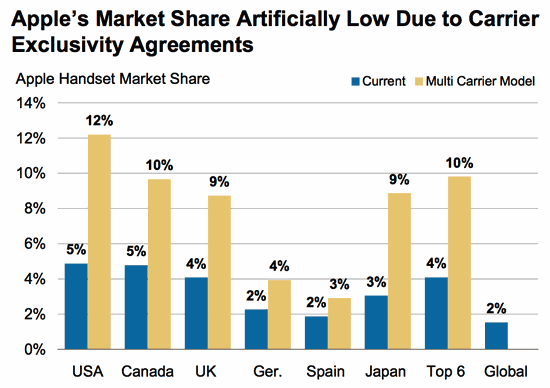Morgan Stanley analyst Kathryn Huberty isn’t exactly spot on when it comes to anticipating Apple earnings, but she raises a good point in a recent note to investors where she lays out a case that Apple could very well double the iPhone’s marketshare by opening up distribution to a number of carriers.
No matter how much people are enamored with the iPhone, not all mobile carriers are created equal and some customers would much rather stick with a carrier they like than switch to a carrier that’s been plagued with connectivity issues (ahem, AT&T). Also, some users are stuck in family plans on non-iPhone networks, and as has been pointed out before, many consumers start off with the carrier of their choice, and then work downwards from there. That being the case, there’s only so much room for Apple to grow under its current business model, and Huberty that Apple could easily double its iPhone marketshare once it universally abandons its reliance on exclusive carrier distribution agreements.
Huberty writes,
In the top six iPhone markets that are still exclusive, we believe that Apple’s market share could rise to 10%, on average, in a multiple carrier distribution model from 4% today. These six markets represented almost 70% percent of iPhone shipments in C2Q09.
As an example, Huberty speculates that if the iPhone becomes on another network here in the US, such as Verizon, it would boost iPhone marketshare to over 12%. The iPhone’s current share of the cell phone market hovers at around 5%.
The iPhone is an expensive device, and AT&T, and other carriers, pay Apple a hefty subsidy on each iPhone sold in exchange for the exclusive right to carry the device. Naturally, should Apple end its exclusive partnership with AT&T, for example, it wouldn’t be able to command as high a subsidy as its used to, but Apple could theoretically make up the difference in volume – a scenario which is more likely than not.
Huberty included the following chart which purports to show the extent iPhone market share would grow with multiple carrier distribution.
Above are the top 6 iPhone markets worldwide, and you can see that with a multi carrier model, iPhone market share could potentially double in some areas.
Citing this potential for growth, Hueberty upped her 2010 EPS estimate for Apple up to $10.50 a share, up from a previous estimate of $10 a share. Huberty also anticipates revenue of $45.3 billion riding on the sale of 41.7 million in iPhone sales.






October 3rd, 2009 at 1:49 pm
As we have seen, when it comes to Apple, Huberty is a moron. On other subjects I’ll let others judge.
Increased market share does not mean increase profits or even increased revenues (if she took even a casual look at Apple’s computer business, she would know this.) Lack of exclusivity would more than eat up all the plump subsidies the iPhone reaps and would not be made up by increased volume and SKU’s.
There will come a time when Apple will change their business plan, maybe even fairly soon, but it will not arrive on the basis of Huberty’s pathetic and amateurish “analysis.”
October 3rd, 2009 at 5:26 pm
Why is it that charts and spreadsheets assume veracity simply because they use numbers? Exactly what validity do the projected sales numbers have? And why o why does no one ask?
October 3rd, 2009 at 8:36 pm
Th is what Andy Zaky said about huberty
http://seekingalpha.com/article/96803-worst-analyst-on-apple-lowers-price-target
BTW on her research note she is just guessing and I agreed with you that multiple carriers do not always ensure that apple will get more added value from them.
October 5th, 2009 at 1:14 am
i don’t disagree with the authors premise, by opening up to other cell companies apple can have more phones in the marketplace. it’s what i’ve been waiting for and will continue to wait for. had at&t once, never again based on how they treated me before.
October 5th, 2009 at 7:32 am
Higher marketshare does NOTE mean greater profit for Apple.
Marketshare means nothing if Apple does not make LOTS more money.
By ending exclusivity agreements, Apple would end up competing with itself. The cachet of Apple is reduced. Apple would be forced to lower the subsidy that carriers are currently paying for each iPhone. This directly lowers Apple’s profits. Thus there is no point at all in ending exclusivity agreements.
Apple is all about profit. Lots of it.
Apple means high end, high cachet value, high desirability, high product lust.
Apple means people love to pay more for its products because of exclusivity.
When you look at where Apple dominates marketshare, what you find is that people buy Apple’s products precisely because of exclusivity, of high cachet value, desirability, and lust. Even poor people buy Apple for these reasons.
Apple is not commodity. Ending exclusivity means turning the iPhone into a commodity product. It lowers Apple’s prices and profits.